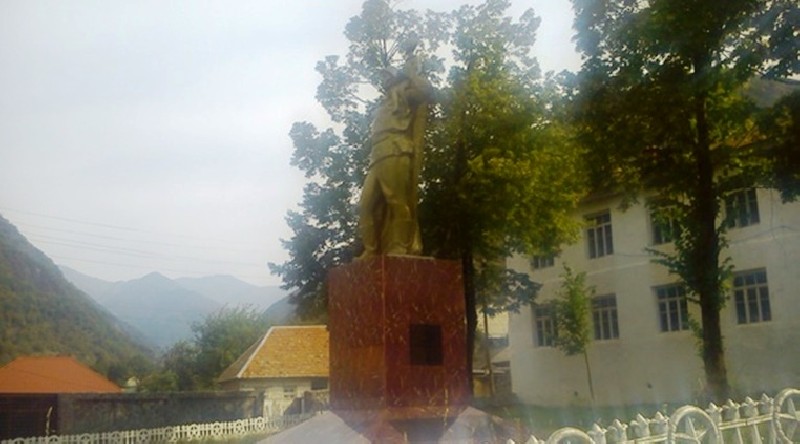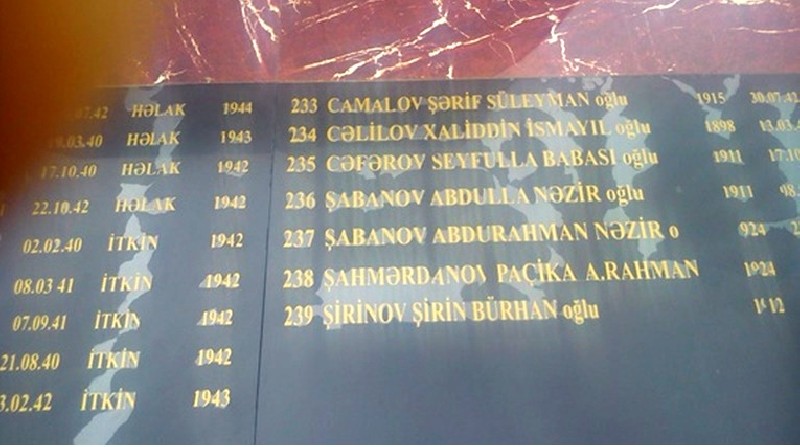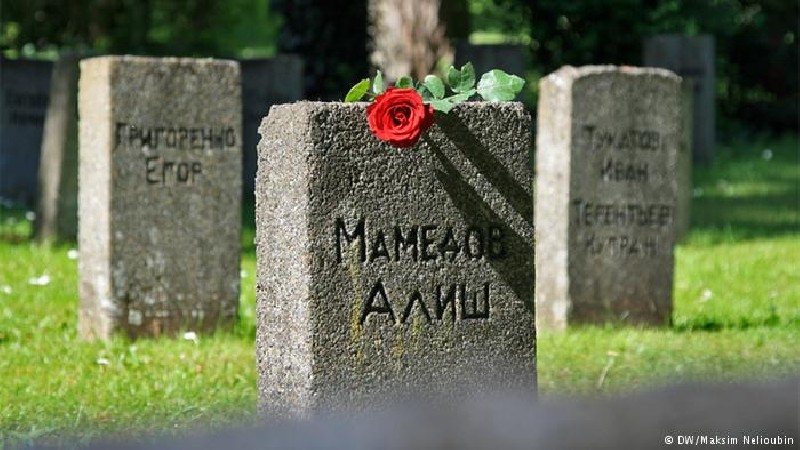
***
Russia celebrates the holiday, as if they won yesterday
The more the date May 9, 1945 goes deep into history, the attitude towards this Victory Day in the entire world, except for Russia, is changing. On 9 May the rest of the world is increasingly becoming one of the many historical dates in the calendar, then the significance of the day of victory for the Russians and the Russian Federation is growing.
The May 9 military parade not only does not shrink on a scale, the more it does not stop at all, but with each year it expands to become a demonstration of the world of new Russian weapons. This year, "the terminators", tank killers, will crawl along Red Square.
In recent years, the annual mass action "Immortal Regiment" unfolded, the St. George ribbon became an indispensable attribute of the clothes of Russians on Victory Day.
In an interview for German "Deutsche Velle" Russian sociologist Alexei Titkov said that in the nineties - early 2000 years Victory Day was the second-third most popular holiday after the New Year, and in 2010 the significance of Victory Day began to grow. It has grown so much that this year for the first time is ahead of the New Year. Undoubtedly, the leadership of the state, Vladimir Putin, is the leading force propagandizing the Victory Day in Russia, the sociologist believes.
In Russian society, they argue: does the new generation have the right to take an active role in the celebration. Can young people wear military uniforms, even if stylized, wear ribbons? Who has won: the veterans, or the country?
Azerbaijan in the shadow of the Russian festival
In Azerbaijan, May 9 remains a non-working day, but there is no military parade in Baku, and the entire celebration fits in the traditional bureaucratized meeting of President I. Aliyev with the few remaining survivors of that war, at the monument to Hero of the Soviet Union Azi Aslanov. One-time cash gifts are issued to the participants of the Great Patriotic War (GPW.)
Azerbaijan remained in the shadow of Russian festivities, as if the Azerbaijanis did not fight on equal terms with Russian and other nationalities.
Director of the Center for the History of the Caucasus, Rizvan Huseynov, with figures on his hands shows the scale of participation of Azerbaijanis in the GPW. These facts are forgotten, in other post-Soviet countries even the Azerbaijanis are represented as a strictly trading nation that did not want to fight for the USSR and who also reluctantly fought for Karabakh.
In fact, every fifth inhabitant of Azerbaijan fought in the GPW: with a population of 3.4 million people (1941), 681.000 people went to the front (more than 10.000 of them were women); more than 300.000 Azeri soldiers died in combat, which is comparable to the losses incurred in the Second World War by countries such as the United States or Great Britain. Every tenth inhabitant of Azerbaijan perished in the war. More than 400 thousand Azerbaijanis were awarded with military orders and medals, 14 soldiers - full knights of the Order of Glory, 128 - Heroes of the Soviet Union.
Azerbaijani soldiers took part in all the most vivid and heroic episodes of the war. The crew of one of the 12 bombers that struck the first bomb attack against Berlin in August 1941 was led by Major Agasaf Samedov. The soldiers of the 416th Azerbaijan division, in Berlin, advancing along Unter den Linden, hoisted a victorious banner over the Brandenburg Gate of the capital of the 3rd Reich.
Of the 60,000 heroic defenders of Sevastopol, 6,000 were Azerbaijanis, our fighters from the 77th Infantry Division stormed Sapun Mountain in 1944.
87 battalions, 1123 self-defense units were established on the territory of Azerbaijan, the 77th, 223rd, 396th, 402nd and 416th national infantry divisions were formed, fighting from the foothills of the Caucasus to the Baltic, Eastern Europe and Berlin. As Marshal Zhukov writes in his book "Memoirs and Reflections," "among the first to break into Berlin from the east was the 416th Division: commander - D.M.Syzranov, chief of the political department - Colonel R.A.Medjidov."
From a small Caucasian village of Ilisu went to war and did not return 239 villagers.
In the photo below is a monument to the dead soldiers Ilisu:


During the war in Baku, more than 130 types of weapons and ammunition were produced. Of the personal savings of the population, 15 kilo of gold, 952 kilo of silver, 320 million rubles were transferred to the defense fund. Sent to the front more than 1.6 million units of necessary goods and 125 wagons of warm clothing. The Azerbaijani Soviet Republic was covered by a network of evacuation hospitals, through which more than 440,000 wounded passed.
Azerbaijan gave to the GPW fronts about 80% of all oil, combustible-lubricating materials and 90% of aviation gasoline. In Russia these facts are diligently forgotten. In the past years messages from Baku to Moscow about the need to give the capital of Azerbaijan the status of a hero city, but Russia pretended that our messages do not notice.
Azerbaijan's peculiarity in changing attitudes towards Victory was public interest and understanding of the participation of Azerbaijanis in the war on the side of Germany. The colors of the flag of the Republic of Azerbaijan are the same as those on the chevrons of the "Azerbaijani legionaries" - a soldier of the Wehrmacht nationality of Azerbaijan.
They got into the German army from captivity, trying to avoid painful death and in any way, but to return home. Baku publishes books, memoirs of the descendants of a few legionaries who returned to Azerbaijan alive from Siberian hard labor. In one of the historical monographs ("Under his banner ..."), the fact of the protection of the first secretary of the Central Committee of the Communist Party of the Azerbaijan Soviet Socialist Republic, Heydar Aliyev, is quoted to the former Wehrmacht officer-Azeri, who returned with his family to his homeland. H.Aliyev defended him from Moscow, who twice sent officers to Baku to arrest the former legionary.
On the side of the Germans, up to 40,000 Azerbaijanis were at war. The attitude towards these people, their fathers and grandfathers, is restrained sympathetic. Historians recall that the hero of the Slovak partisan movement, Hero of the Soviet Union Mehdi Huseynzade moved to the partisans from the German army, where he got caught captive by the officer of the Red Army.
In fact, both regimes for the Azerbaijani soldier were foreign," writes historian Mammad Jafarli in the preface to the book" Under his banner. Notes by the adjutant of His Excellency" (the author is the son of the legionary Rustam Aleskerov.) Jafarli emphasizes that "the legionaries fought for the liberation of their abused homeland from the hated Bolsheviks."
Germany in the shadow of defeat
It is more difficult to assess the historical significance of the victory over fascism in Germany. The German government does not celebrate the 73rd anniversary of the end of the Second World War in Europe. But hundreds of museums and private initiatives remind of it and the period of Nazism day by day, writes Deutsche Welle.

Bio cemetery near Siegburg in the North Rhine - Westphalia
In Germany, as in most European countries, the day of the end of the Second World War in Europe is considered May 8. The most famous and noteworthy event that ever took place in Germany on this day was the speech of the then Federal President Richard von Weizsäcker on the fortieth anniversary of the end of the war when he first called May 8 the day of the liberation of the Germans from Nazism.
The chancellor's schedule for the current week does not have anything planned relating to the events of 73 years ago. It is not excluded that Angela Merkel will congratulate the Presidents of France and Ukraine - Emmanuel Macron and Petro Poroshenko - on the 10th of May in Aachen. The press service of the Lower Chamber of the German parliament told DW correspondent that the current week is free from meetings and it is not going to gather from its constituencies on the occasion of the anniversary of the end of the Second World War in Europe.
Some members of the Bundestag, as well as representatives of the Berlin Senate, like every year, take part in wreath-laying ceremonies for monuments to Soviet soldiers in Berlin, which diplomats from the embassies of the countries of the former USSR hold. Ukrainian diplomats lay wreaths on May 8, Russian - traditionally the 9th.
Every year - and not only on a round anniversary - a big holiday is held on May 8 by the German-Russian Museum Berlin-Karlshorst, in the building where the officer casino of the Wehrmacht Engineers College was once located, on the night of May 9, an act of unconditional surrender of Nazi Germany in the Second World War.
In the program of the festival - a children's choir of the Shostakovich Music School in the Berlin district of Lichtenberg, every hour of the museum's excursion in German, Russian and English, a special exposition dedicated to the first decade of the Red Army. There will also be a presentation of the report "The End of the War in the Media," a public discussion of historians on the theme "The Reichstag - the best Soviet trophy", the display of old feature films about the war - Soviet, French and made in the German Democratic Republic, a program for children and much more. At 22.00 - traditional "Toast for Peace".
Director of the museum Jörg Morré told DW that mostly people from neighboring houses, many with children, pensioners, but also many Russian-speaking Berliners, including veterans of the Great Patriotic War who moved to the German capital, come to the holiday. and here it's getting smaller. The delegation of veterans from Belarus and Russia, as well as former servicemen of the Western Group of Forces of the USSR, who was quartered in the German Democratic Republic, came to the festival.
Of the German officials, lamented Morre, this year promised to be only representatives of the district authorities. The Berlin senator for culture was going to visit, but he was distracted by other affairs. "Maybe Senator of Internal Affairs Andreas Geisel will come in," the director of the museum suggested," not as an official person, but as a neighbor, he lives next door."













Leave a review